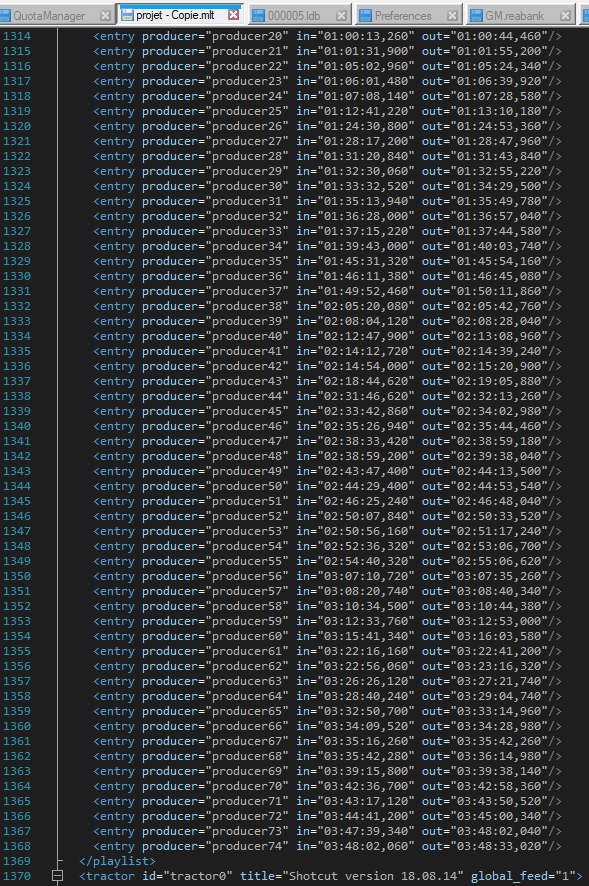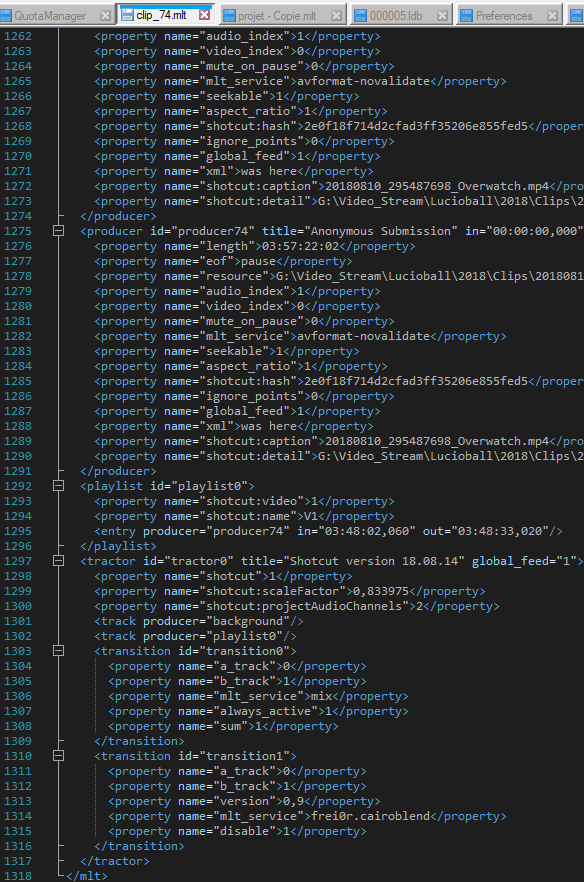Hello,
this is my first time here, I am working on a project that require a lots of editing on big files to then create lots of clips, unfortunately Shotcut is not friendly at all about that.
Took me a couple hours to get back to Python but i’ve made a workaround.
the following Python 3.6 Script actually do the following :
- Copy the project " *.mlt " file in RAM
- recreate multiple copy of the same " *.mlt " but modify the Playlist Entries
It works with project that was made like the following steps :
- Open shotcut
- Add your video in the Playlist Section
- add the video from Playlist -> Timetable
- cut the part of the video that you want to keep (only one video track)
- save the project
Python 3.6 Script Shotcut_export_timetable_as_clips.txt (3.3 KB) :
# read file
# save each line into list_original_file
# find the Playlist: starting line, ending line, number or entry
# add the Entry lines from the playlist into list_of_entry
# (List.pop() )delete the entry lines INSIDE list_original_file <- delete items in list from line_number_start to line_number_end
# for entry in list_of_entry
# Create a new_file using <new_file_starting_name + iterator_number + new_file_extention>
# make a temporary copy of list_original_file
# List.insert(i, entry[i])
# write all lines inside the temporary copy of list_original_file inside the new_file
file_to_read = 'projet - Copie.mlt'
new_file_starting_name = 'clip_'
new_file_extention = '.mlt'
starting_line_match = ' <playlist id="playlist0">'
ending_line_match = ' </playlist>'
temp_number = 0
line_number = 0
line_number_start = 0
line_number_end = 0
list_of_entry = []
list_original_file = []
list_temporary_file = []
print('Read file')
with open(file_to_read) as search: # read file
for line in search:
line_number += 1
list_original_file.append(line) # save each line into list_original_file
line = line.rstrip() # remove '\n' at end of line
if starting_line_match == line: # find the Playlist: starting line, ending line, number or entry
#print(f'{line} at line {line_number}')
line_number_start = line_number
if ending_line_match == line and line_number_start != 0:
#print(f'{line} at line {line_number}')
line_number_end = line_number
if line_number_start == 0 or line_number_end == 0:
print('Playlist Not Found')
else:
print('Playlist Found')
line_number_start += 3
line_number = 0
with open(file_to_read) as search:
for line in search:
line_number += 1
if line_number >= line_number_start and line_number < line_number_end:
list_of_entry.append(line) # add the Entry lines from the playlist into list_of_entry
#print(len(list_of_entry))
#print(len(list_original_file))
temp_number = 0
for entry in list_of_entry: #delete the entry lines INSIDE list_original_file
list_original_file.remove(entry)
print('temporary file modified ready to create projects Clips')
#print(len(list_original_file))
temp_number = 1
print('Creating projects Clips')
for entry in list_of_entry: # for entry in list_of_entry
filename = new_file_starting_name + str(temp_number) + new_file_extention # Create a new_file using <new_file_starting_name + iterator_number + new_file_extention>
try:
file = open(filename, 'r')
except IOError:
file = open(filename, 'w')
list_temporary_file = list_original_file.copy() # make a temporary copy of list_original_file
list_temporary_file.insert(line_number_start-1, list_of_entry[temp_number-1]) # List.insert(i, entry[i])
for line in list_temporary_file: # write all lines inside the temporary copy of list_original_file inside the new_file
file.write(line)
file.close()
temp_number +=1
print('Work is finished')
You can obviously modify and reshare it to make it more user-friendly by using some “raw_input” function.
After the clips are created, you simply import (open) them into Shotcut and export as “Each Playlist Item”, careful with big video files it can overload Shotcut in RAM or just crash it (for me it get stuck at 16GB or RAM and then crash while having 32GB of RAM in total)
Some screenshots to show the result :

from
to
Thank you for this awesome software guys 
EDIT : i’ll let the moderators or admin modify my post to make the images viewable as i will probably not spend time leveling on this forum, just came here to help some. 


